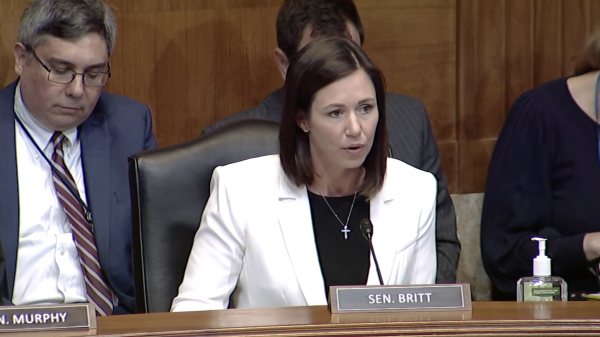When Jorge Ruiz was sentenced in an Autauga County courtroom in early August to 99 years in prison for the accidental death of a Deatsville nurse, it marked the end of one of the more shameful stretches of injustices in Alabama legal history.
Ruiz, a Mexican national who was in the country on a proper and legal work visa, was steamrolled by a county district attorney’s office looking to appease an angry public, was jailed against normal procedures without bond, was falsely labeled as both a drunk driver and an “illegal immigrant” by local newspapers (which still haven’t corrected the erroneous stories) and had his family bilked out of thousands of dollars by attorneys and a bail bondsman.
That’s the price, it seems, for making a mistake while being Hispanic in Alabama.
But maybe one that’s too steep for the trial judge, Circuit Court Judge Bill Lewis, who appears to have second thoughts about his 99-year sentence and seems to be maneuvering for one of the weirdest do-overs in legal history.
But first things first.
There is no question that Ruiz made a mistake — a bad one. The 19-year-old was coming through Alabama on his way back to his native Mexico. Ruiz was traveling home to be with family after the unexpected death of his mother, and he stopped in Alabama to visit family members who lived near Prattville.
During the brief stay, he went to a party with family and friends near Birmingham. After working a full day, Ruiz drove to Birmingham, stayed up most of the night at the party and was returning to Prattville early the next morning, driving on no sleep. He had consumed alcohol at the party, but several hours earlier. His family members, who spoke to APR, said that Ruiz consumed a “small amount” of alcohol but that he purposely waited a period of time to avoid driving while intoxicated.
He did drive while sleepy. And on Highway 31, just after exiting the interstate, Ruiz apparently nodded off. His truck drifted across the centerline and collided — without ever slowing down — with the car driven by Marlena Hayes, a 29-year-old nurse who was leaving her shift at the hospital. The impact killed Hayes.
It was an accidental death caused by the misjudgment of a teenager. One that deserved punishment by the legal system.
The Over Charge
In most cases, such an accident — particularly one in which the victim wasn’t wearing a seatbelt — is deemed manslaughter (it is often termed “vehicular manslaughter” in other states, but Alabama lacks that designation), and the driver receives somewhere between probation and a few years of jail time. For example, the 16-year-old who killed Auburn radio announcer Rob Bramblett and his wife after falling asleep was charged with manslaughter, and sources close to that case indicate the Lee County DA is seeking a sentence in the neighborhood of 10 years, suspended, with up to one year in some form of a detention facility.
Earlier this year, a truck driver in Arizona who fell asleep at the wheel and killed 13 people on a tour bus received a four-year sentence for vehicular manslaughter.
But Autauga County DA Randall Houston, facing a wave of outrage from locals who were upset by Hayes’ death at the hands of a “illegal immigrant” who was “driving drunk” — claims sparked by erroneous news reports in the Clanton Advertiser and Montgomery Advertiser and on TV websites — charged Ruiz with reckless murder. The DA’s office would later recommend a sentence of 50 years.
“There is no grounds for reckless murder in this case,” said an attorney who is now involved in the case and spoke about it on condition of anonymity to avoid possible punitive action against Ruiz. “With the facts in evidence, Ruiz would have had to turn the wheel and drive purposely on the wrong side of the highway into oncoming traffic to meet that standard.”
Even if Ruiz had been driving while intoxicated, he would have received a lesser charge and a lighter sentence. He wasn’t intoxicated, though, which a toxicology report proved. But that didn’t stop authorities from using it against him, while also using that the fact that he wasn’t driving while intoxicated to up his sentence.
According to Ruiz’s first attorney, Stephen NeSmith, in Ruiz’s initial appearance before a District Court judge in Autauga County, the DA’s office told the judge that Ruiz should be denied bond because Ruiz’s blood alcohol level at the time of the crash exceeded .020, the legal limit for a minor.
But that wasn’t true.
Ruiz wasn’t arrested at the scene of the accident. Instead, he was transported to the hospital and wasn’t accompanied by a state trooper. A trooper later arrived at the hospital and asked permission to take a sample of Ruiz’s blood, which Ruiz granted. Ruiz was not arrested at the hospital and was allowed to leave. A trooper went to his residence several hours later and arrested him.
The toxicology report from that blood sample showed that Ruiz’s BAC was just .016 — well under the legal limit for adults (.08) and below the limit for minors. It was also below the threshold at which doctors believe alcohol consumption begins to impair motor function.
Still, Ruiz was denied bond because of the representation made to the court by the DA’s office, according to NeSmith.
“I can’t recall if it was the assistant DA who stated it or if that information came from a witness, the trooper in the case, but that was the only excuse for not granting bond initially,” NeSmith said. “Later, I believe, Ruiz’s attorney was able to get a copy of the toxicology report, but I did not have one at that point.”
Hinting that Ruiz was driving drunk wasn’t exactly above the attorneys in the DA’s office who worked the case. The day of the sentencing of Ruiz, assistant DA C.J. Robinson wrote on his Facebook page thanking Lewis for his sentence. Robinson also linked to a newspaper story about the sentencing and wrote, “to everyone who thinks about drinking alcohol and driving please read this article … and hand someone else the keys next time.”
This was the same DA’s office that allowed a trooper to testify that Ruiz looked and acted intoxicated after the crash, despite knowing that the trooper didn’t perform a field sobriety test and that the toxicology report in evidence showed Ruiz’s BAC was .016.
APR submitted detailed questions to the Autauga County DA’s office about every claim made by Ruiz’s family, attorneys and information from a variety of sources about the case. The DA’s office failed to respond in more than four days. An assistant to Houston confirmed receipt of the questions but no response was received.
The Bilking of the Ruiz Family
The DA’s office would not be the only attorneys to behave questionably, in the opinion of the Ruiz family. Ruiz’s father paid NeSmith $2,500 — a fact the attorney confirmed — and the Mexican Consulate in Atlanta paid another attorney $5,000. NeSmith worked only through the initial appearance and the second attorney worked a total of 11 days.
“Neither one did much,” said a member of Ruiz’s family, who spoke on condition of anonymity out of fear that the family could suffer retaliation. “We put our trust and money in them — we don’t have much money — and they left us with nothing.”
For his part, NeSmith contends that he worked for the $2,500 he received. When asked what he did for the money, in addition to making the initial appearance with Ruiz, he cited several phone calls to the assistant DA and meeting twice with Ruiz at the jail.
Ruiz’s second attorney, Brent Helms — who also recently represented a dead fetus in a controversial abortion case in Huntsville — worked to try and get Ruiz out on bond after obtaining a copy of the toxicology report that showed Ruiz wasn’t intoxicated.
Helms was initially successful and Judge Lewis granted a $50,000 bond. Ruiz’s father immediately contracted with a bail bonds company, Affordable Bail Bonds, to get Ruiz out of jail, putting down the standard 10 percent ($5,000).
Affordable Bail Bonds owner Lakisha Kelley said she went to Autauga County Jail and provided a check to cover the bond. But before releasing Ruiz, Autauga County Jail officers contacted the U.S. Immigration and Customs Enforcement agency (ICE) and reported that Ruiz didn’t have a social security number or a valid work visa.
A request for comment on the Ruiz situation did not receive a response from Autauga Jail officials.
ICE issued an “immigration detainer” request to Autauga County to hold Ruiz in custody. ICE agents took custody of Ruiz a day later, according to records and information provided by the Ruiz family, and the Autauga County DA’s office would later tell Judge Lewis that the agency had transported Ruiz to Louisiana for deportation because his visa had expired.
In light of that situation, the DA’s office asked Lewis to revoke Ruiz’s bond, forcing him back to Autauga County and to hold him without bond because his immigration status made him a flight risk. As Helms would later note in a motion filed in the case, the DA’s sole reason for revoking his bond was the ICE detainment.
However, those were mostly lies, according to the Ruiz family and two sources with specific knowledge of Ruiz’s immigration status and his time in ICE custody. Ruiz’s family members said Ruiz told them that he was never transported to Louisiana, but instead was sent to Montgomery to another jail facility, where he spent a few hours.
Two sources confirmed to APR that Ruiz never went to Louisiana or left the state of Alabama. They could not be certain that he was held in Montgomery, but they said he was returned to Autauga County within 24 hours of leaving that facility.
Again, Autauga County DA Randall Houston did not answer specific questions about this incident.
But the apparent ruse worked. Lewis withdrew Ruiz’s bond and ordered him held in the Autauga County Jail until trial. ICE officials — not exactly known for their cooperation with local law enforcement — had Ruiz back in Prattville within hours, where he remained for six months.
To add insult to the entire ordeal, Kelley, the bail bondsman, refused to return the money paid by Ruiz’s father, despite the fact that Ruiz never left law enforcement custody and his bond had been revoked.
When APR asked Kelley why she refused to return the money, she said that she met her requirement under the law and that it “happens all the time.”
“When I issue the check, that’s my requirement,” Kelley said. “Happens to people all the time. We pay the bond, the jail calls around and checks for warrants in other places and they turn whoever over to the other department. They don’t get their money back neither. That’s how it works.”
An Unjust Sentence
For the Ruiz family, it was just one more injustice in a growing string, and the worst was yet to come.
On August 14, after a trial in front of one black and 11 white jurors, Ruiz was sentenced by Lewis to 99 years in prison for the reckless murder of Hayes. It was, to say the least, a shock to his family and most observers in the courtroom.
Before issuing the sentence, Lewis went on a bit of a tirade, appearing to grandstand for the family members and friends of the victim who were in the courtroom. Lewis told Ruiz that he had exhibited no remorse, despite the fact that just minutes earlier, Ruiz, who speaks little English and required an interpreter to understand what was happening during the trial, had tearfully apologized to Hayes’ family and to the court.
Lewis’ tirade was also partially sparked by Ruiz’s refusal to accept a plea deal from the DA’s office. However, that wasn’t exactly Ruiz’s call. His trial attorney, Richard Lively, who was appointed by the court, told Lewis prior to sentencing that he had advised Ruiz not to take the deals offered by the DA’s office, because Lively felt the reckless murder charge was unfounded and improper.
And now, in a remarkable turn of events, it seems Lewis is using Lively’s remarks to launch an appeal on behalf of Ruiz on the grounds of ineffective counsel.
In an order filed two weeks ago, Lewis removed Lively from the case, appointed a new attorney, and offered a lengthy explanation that noted no appeals had been filed (Lively said he was working on the appeal and still had a few days left). The order also included quotes from the trial transcript in which Lively told Lewis that he advised Ruiz not to take a plea deal.
The order also, oddly, includes a defense to the theory that Ruiz was asleep. Lewis said that while Lively made that argument to the court, it was never presented to a jury. That theory was also presented in an APR opinion piece that was published a couple of days after Lewis’ 99-year sentence.
A few days after Lively was removed, Ruiz’s new attorney, Carlton Taylor, filed several motions, including one asking for a new trial on the grounds of ineffective counsel. The next day, Lewis issued a new order telling the DA’s office to submit a brief addressing the motion for a new trial and set an evidentiary hearing for Oct. 30.
Such things are not normal practice.
And so, things are a mess, because the legal system in Autauga County failed to dispense justice blindly. Instead, the system bent to over-punish someone because the mob demanded it.
Jorge Ruiz deserved to be punished for what he did. But what happened to him at the hands of men and women who are supposed to uphold the law and administer justice was a bigger crime.





















































